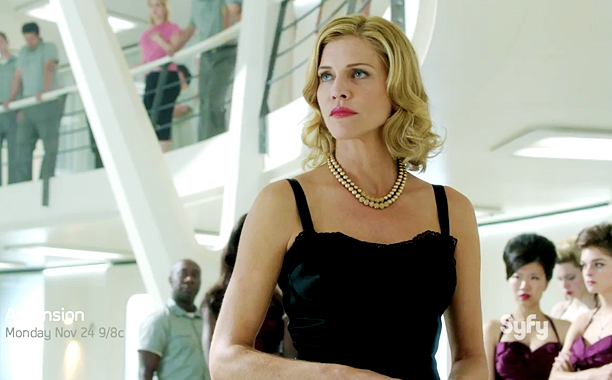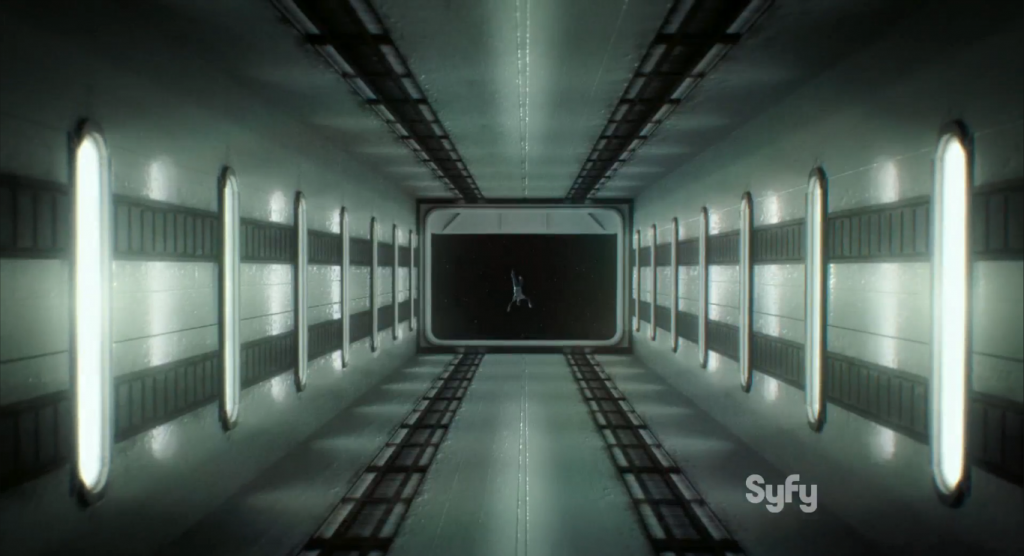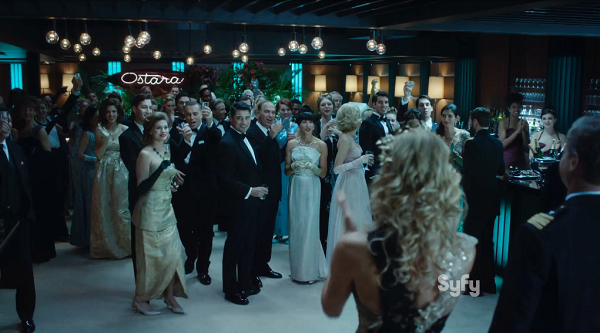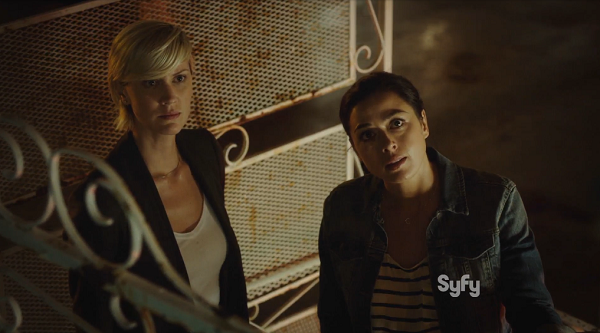Last week, SyFy premiered Ascension, a three-night miniseries event. Deadshirt editors Christina Harrington and Dylan Roth had a look, and were pretty damn impressed.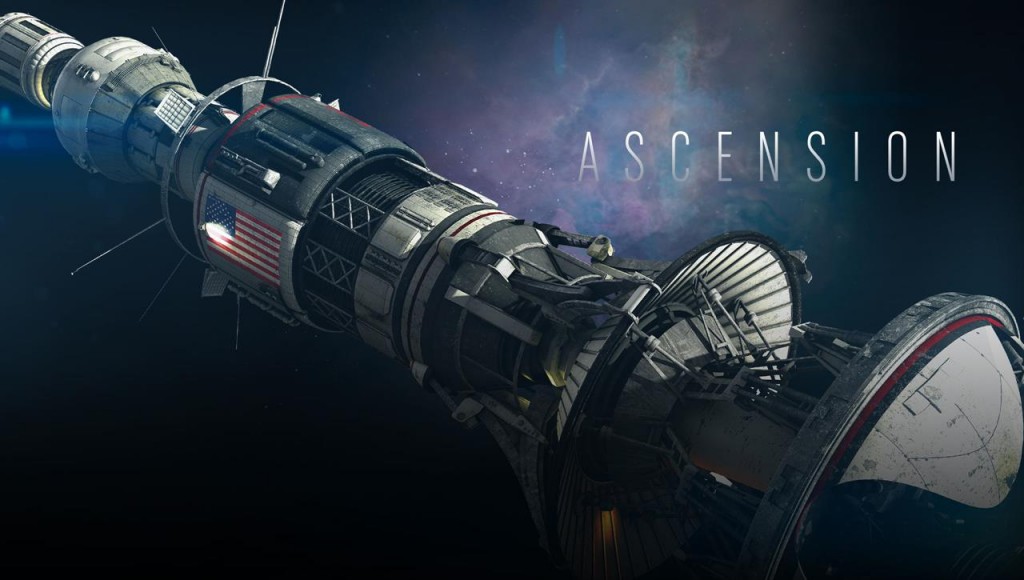 Christina: If Ascension did one thing for me, it made me really miss the days when SyFy took its programming seriously, like with Battlestar Galactica. Actually, it makes me miss BSG a lot. But more than that, Ascension is a hell of a good science fiction program, and I really hope we get to see more of it in the coming year.
Christina: If Ascension did one thing for me, it made me really miss the days when SyFy took its programming seriously, like with Battlestar Galactica. Actually, it makes me miss BSG a lot. But more than that, Ascension is a hell of a good science fiction program, and I really hope we get to see more of it in the coming year.
Dylan: SyFy’s program directors have recently admitted that they really blew their shot at establishing the network as a prestige channel after BSG. It’s easy to forget that SyFy (then The SciFi Channel) was receiving rave reviews and scholarly attention before AMC launched either Mad Men or Breaking Bad. They had the opportunity to lead the basic cable pack, but opted for cheap and easy (though admittedly fun) crap like Sharknado. Ascension feels like a major course correction.
Christina: Yeah, we all know how much I love watching shit like Sharknado, but your channel can’t only be known for popcorn television, you need “main course” material, too, and Ascension feels like a meaty entrée. Not only is the premise unique, it feels completely different from what else is being shown on SyFy right now. The narrative is complex, the ensemble cast is incredibly talented, and the myth-arc it builds in its three-night run is ambitious—ambition being severely lacking in the stories we usually see on this channel, and a trait necessary to all good science fiction.
Dylan: Ascension is the story of a generation ship, a spacecraft on a century-long voyage to a new world, midway through its mission. The people living aboard the eponymous craft are neither the people who chose to set out on the mission, nor are they the people who will complete it. Their whole life will be spent onboard, maintaining the ship and producing the next, more important generation. An extra wrinkle: the original crew set off in 1963, and since then they’ve had no contact with Earth, so their society hasn’t gone through the same changes that the rest of us did in the tumultuous second half of the twentieth century.
Christina: That premise alone hooked Dylan and I into watching this show, because this is actually a sci-fi premise we’ve discussed before, and we find the possibility for storytelling within it to be endless. But then, about an hour into Ascension, EVERYTHING CHANGED. And then, everything changed again about twice more after that. The writers and creators of the show are careful to reveal facts and information to the audience in such a way that we actually don’t know what Ascension‘s real mission is until the last five minutes of the entire show. And even then, we’re left with more questions than are answered. This has to be a jump-off point for an actual ongoing series, right?
Dylan: Because of the show’s complete lack of a status quo and some fucking nutso twists at the end of each night of the miniseries, it would be impossible to talk about Ascension without spoiling it a ton. So, if you’re interested in watching the show, jump off here.
SPOILERS AHEAD
Christina: At the end of the first night, it’s revealed that Ascension never actually left Earth. Though the people onboard truly believe that they’re headed for Proxima Centauri–the closest planet to Earth–they’re actually part of a closely-monitored experiment whose true purpose is kept secret until the very last few minutes of the entire miniseries. We’re given a number of fake-out reasons for the Ascension project, but Harris Enzmann (Gil Bellows), the character that gives us these reasons, is untrustworthy, as it is to his advantage to lie and obfuscate so he doesn’t lose control of the project his father began and entrusted to him. We’re originally told that the Ascension project is a test to see how human beings will endure (and IF we can endure) unfathomably long deep-space flights. But then preteen Christa (Ellie O’Brien)—friend of the dead woman whose murder sparks the beginning of the narrative—starts having visions and manifesting some sort of electric blasts that, as the last scene of the show reveals, can transport characters to the real-life Proxima Centauri. Then boom, cut to black, and roll credits.
Dylan: While the character drama and development are properly paced for a six-hour runtime, the sci-fi twists that are gradually rolled out throughout the miniseries could have easily driven three seasons of TV. Imagine the satisfaction of drawing out the reveal that Ascension wasn’t actually heading anywhere for thirteen episodes, then introducing the contemporary Earth characters for Season Two, and slowly building up to the metahuman, superpowery stuff during the third year. This short mini-season piled on huge story shifts one after another and it still plays out really well, but man, I could have used a lot more of it.
Christina: The complex nature of the plot was to the detriment of world-building, and to the expansion of the idea that the culture and people of the Ascension, for all intents and purposes, exist in an alternate universe stemming from 1963. Over and over again on the show, we’re told that these are a group of people who never lived through the Civil Rights Movement, the sexual revolution, the death of JFK, and an innumerable amount of other cultural markers that our world grew from. But here’s the thing: when elements of the 1960s are used on the show, it’s almost always in superficial, convenient ways. Clothing, haircuts, and technology fit into a loose 1960s aesthetic, but the chance to explore how an isolated society has changed is rarely taken. And there have been obvious social advances since the ship took off. The XO (the honorable and conflicted Aaron Gault, played by Brandon P. Bell) is a black man, for instance, and women have careers that they might not have otherwise had in the 1960s, but we’re never shown what the Ascension‘s equivalent to the Civil Rights Movement was, nor is race or gender ever really an issue in the show. The only societal imbalance that we’re ever privvy to is between the “upper deckers” and the “lower deckers,” and even this isn’t fleshed out beyond “lower deckers are scum, upper deckers are aristocrats.” The show indicates that mobility between upper and lower decks is fluid, with upper deckers at risk of being demoted should they break the law or lose their job. Though the ability to advance upward is much harder to achieve, lower deckers are given the opportunity (though few) to advance to the upper decks. I wish societal differences were given more attention beyond being just background noise, and beyond just showing the various parties and celebrations that seem to make up the majority of Ascension‘s culture.
Dylan: You called the use of the show’s sorta-sixties setting “convenient,” and I think that’s the perfect word for it. The show has built in a number of outs to explain away anything that doesn’t quite fit with the established aesthetic of the show. If you ask ever ask yourself “could they really have built a ship like this in 1963 and get it to fly?” Good news, it’s not actually flying, it’s basically an enormous, hermetically-sealed skyscraper, the people inside just don’t know it. “They sure have some pretty contemporary technology aboard Ascension.” We’re told that the crew has invented tech that the observation team would later bring to our world, but even that is suspect. The observation team has a mole inside the ship, and the mole’s father is the “inventor” of Ascension‘s MRI machine, which begs the question as to whether or not the people on contemporary Earth are secretly feeding our technology to the timestuck crew. They want their characters to dress like the ’60s, but they don’t want to have to contend with any of the storytelling limitations or even opportunities that come along with it.
Christina: And even hand-waving the more progressive elements of Ascension‘s society (birth control is not only free, but required, for instance) by assuming the people that began the trip, known colloquially as The Originals, were super ahead of their time, morally speaking, is absolute bullshit. THEY DIDN’T LET GAY PEOPLE ON THE SHIP. Like, they literally come out and say that. Samantha Krueger (Lauren Lee Smith), an outside investigator brought in to study and report back on the anomalies within Ascension (such as murder) to Enzmann’s boss, is a lesbian who eventually asks about gay people on Ascension. Enzmann replies that none were allowed on, smugly explaining that only heterosexuals were allowed because reproduction had to be a core value on the ship. This makes absolutely no fucking sense. Disregarding the fact that gay people can and do have children, within the logic of the show we’re told over and over again that the birth rate of the ship has to be closely monitored, with very, very few people being allowed to have babies every year (see the birth control thing above). Reproduction won’t be an important part of the mission until they land and need to start producing more humans so they can have an active society, and more people to grow food, build buildings, explore, what have you. Besides, this logic totally ignores a really important fact: straight people have gay children, like, all the fucking time. Instead of bothering to deal with the interesting idea that The Originals were freaking homophobes, the show just handwaves it away as a product of practical thinking. It’s just so stupid, and so indicative of the fact that the writers didn’t have time to focus on the more complicated aspects of a perpetual 1960s America.
Dylan: For all of Ascension‘s great elements, it doesn’t have the teeth of, say, BioShock Infinite, which had zero qualms about showing its weird, retrofuturistic society for the bigoted mess that it would have been. With the exception of the hand-waved “no gays in space” thing, Ascension is far closer to a utopia we would imagine now than what would have been imagined by a bunch of rich white people in mid-century America. Which is great and all, but it doesn’t deliver on the most advertised conceit of the show. If they want to promise Mad Men in space, they should deliver Mad Men in space, warts and all.
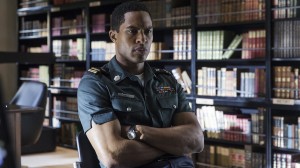
Brandon Paul plays Aaron Gault, Ascension‘s second in command, placed in charge of investigating the ship’s first homicide.
Christina: So, as we mentioned earlier, the whole show starts with the murder of a beautiful, popular young woman named Lorelai. The investigation into her murder uncovers a nastier side to her, as well as a conspiracy that ends up rocking the community to its core. Add to this mix a boyfriend named James who starts dating the Lorelai’s best friend, a videotape of the dead girl that gets played almost non-stop, and a multi-faceted cast of characters, and it sounds like I’m describing Twin Peaks, huh?
Dylan: Ascension begins like Twin Peaks in space, and like Twin Peaks, the murder of Laura Lorelai Wright is just a gateway to getting to know this weird small town and its characters, most of whom have secrets of their own. Solving her murder, just like in Twin Peaks, is ultimately unimportant compared to all the crazy shit that’s revealed in its wake. We do get the solution to the crime, but by then the stakes have been raised so much that solving the murder does little to release the tension. There’s a little girl who is basically Dr. Manhattan now, so murder shmurder.
Christina: I can’t tell if all these allusions to Twin Peaks were done on purpose or if I’ve just watched that show too many times and now I see it in everything. Despite my criticisms of Ascension, I truly enjoyed this miniseries. The many plot twists were surprising, often in their content but also in their timing. When it’s revealed in the first few minutes of the first episode that we’re going to split the show between the ship and modern-day Earth, I was a little disappointed. But that jump so early is necessary and I became as invested in the lives of the people on Earth, especially John Stokes (Brad Carter) and Samantha Krueger, as I was in the characters aboard the Ascension.
Dylan: The Earth plot seemed annoying to me before the twist, but after the big reveal that Ascension never left Earth, it opened up the story to a ton of new sci-fi dilemmas. Ascension became a show that could simultaneously be about a confused lost generation isolated in space but also be a sort of twisted sci-fi take on obsession, control, and reality TV voyeurism. The two stories could work separately, but together it sparks some real magic.
Christina: There were a number of moments on the show that really struck home with me, the first being the reveal that Ascension had never really left Earth. This could have been a moment that felt rehearsed, or felt taken from an old Twilight Zone episode, but instead, it was thrilling and surprising. John Stokes, a lower-decker accused of Lorelai’s murder, gets sucked out an airlock and tumbles through “space” silently before WHAM landing on a big blue stunt pad and being ushered off to a basement jail cell by Enzmann’s workers. That was the moment when these two storylines converged, and when the show started really working for me. Stokes’ storyline in the third episode is especially heart-wrenching, as Krueger breaks him out of the Ascension facility and attempts to hide him from Enzmann and his associates. The Stokes we see up until this point is a man who is truly broken, a man who is determined to find the captain and seek revenge at any cost. He’s a sympathetic character, sure, but one whose violence makes it hard to really connect with him, until he sees the sun for the first time. And then, suddenly, Stokes is the heart of the show. This is especially true later on when Krueger finds him drunkenly staring at the moon. “So far the only thing that impresses me about here is right there,” he says, pointing at it with a vodka bottle.. By the end of the series, Stokes is all alone on an Earth that he doesn’t recognize and that has no real ability to survive in, all while trying to evade a company that will kill him if they find him. Stokes’ arc is left open-ended, as are a lot of arcs on this show, which just leaves me hoping that SyFy has enough faith in this miniseries to continue it as an ongoing next year, and that we will hopefully, someday, see a real conclusion to this story.
Dylan: In the tradition of the 2003 Battlestar Galactica miniseries, this first run of Ascension is meant to be the launchpad for an ongoing series, and I find myself desperate for this to happen. After half a decade of squandering its potential and goodwill, SyFy seems finally interested in picking up where it left off with BSG. Ascension feels like BSG‘s long-awaited successor, and this feeling is aided greatly by the presence of top-billed actress Tricia Helfer, who continues to be a singularly captivating and nuanced performer. Like in BSG, Helfer plays a commanding, complicated character (who is naked a lot, because SyFy, I guess), with her arc in Ascension having her go from enigmatic sex kitten, to vulnerable, betrayed wife, to the goddamn captain of the ship, while most of the other characters are standing still. Kicking off the ongoing series with Helfer as the more obvious leader of the ensemble would be a very good decision. In the meantime, the level of ambition this show demonstrates makes me hopeful for the future direction of SyFy as a network, and television sci-fi as a genre.
Ascension is available to watch on demand at SyFy.com.

